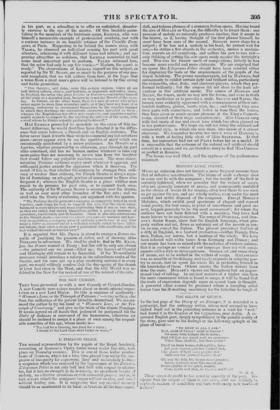MODERN LYRIC POETRY.
MUSICAL criticism does not furnish a more frequent censure than that of defective accentuation. The blame of such a charge does in some sort lie wide the composer ; but the weight of the fault is certainly lightened, when we consider that the writers of songs, who are generally ignorant of music, and consequently unskilled in the choice of words lit for singing, often lead them to use such as jar against the ear, and are wholly restive, even under the most careful and artful disposal of the composer. Except Momts's Melodies, which exhibit good specimens of elegant and correct vocal poetry, the best songs, in point of smoothness and good ac- cent, happen generally to be the most nonsensical ; for where the authors have not been fettered with a meaning, they have had more leisure to be euphonious. The songs of PURCELL, and Die- woes Sailor Songs, show that the English language, when pro- perly written and set, flows as naturally out of the mouth in mu- sic as any, except the Italian. The present prevailing fashion of a ditty in England, is a bastard production—neither French, Ger- man, Italian, nor native, but a mixture of the whole. We have been infested with waltz tunes from Germany and France ; and our music has been so mixed with the melodies of various nations, that it is perhaps no wonder if our language does not well amal- gamate with a style so heterogeneous. Greater art and some study of music, are to be wished in the writers of songs. METASTASIO was so sensible of the delicacy and nicety requisite in adapting poe- try to music, that he spent his whole life in perfecting himself in the knowledge of them. Others among the Italian writers have done the same. MOZART'S operas are throughout but an impas- sipped kind of talking. In musical matters of a higher aim than the mere amusement which is found in songs, it will be found that the truth of expression depends more on accent than is thought. A powerful effect cannot be produced where a bungling artist leaves bare his ill-working machinery for the beholder to laugh at


















 Previous page
Previous page